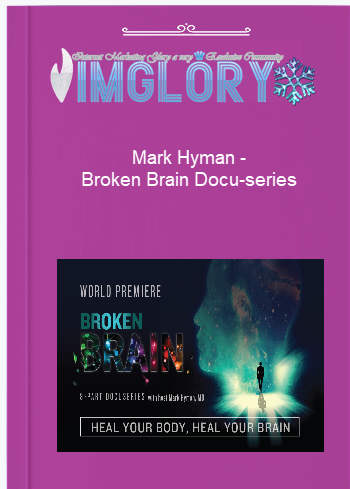
Hypnosis & NLP
Mark Hyman – Broken Brain Docu-series
- Product Name : Broken Brain Docu-series
- Creator : Mark Hyman
- Language : English
- Type : Hypnosis & NLP
- Price :
$397 - Size : NaN
- Homepage : Salespage
Features
- About 20 years ago, at the start of my medical career, I went from being a healthy, thriving physician to becoming a disoriented and terrified version of myself. I woke up feeling like I didn’t even know who I was anymore. I was depressed, anxious, forgetful. It got so bad that I had a hard time following what my patients were saying during their appointments. I tried to take careful notes and keep track, but I couldn’t focus on our conversations. I couldn’t even remember anyone’s name.
- Some doctors, including my colleagues, said that I was depressed and recommended taking anti-depressants. I saw a few psychiatrists who suggested anti-anxiety medication. My family doctor prescribed me sleeping medication, and a neurologist told me that I had ADD and needed stimulants. Other doctors told me that I had chronic fatigue and fibromyalgia. At that point, I was exhausted and I needed answers. All that I knew for sure was that my brain was broken. I was depressed, my memory was failing me, and my body just wasn’t working the way it used to.
- These doctors had good intentions, but all of the recommendations for another pill did not sit well with me. So, I decided to go on my own journey to heal my broken brain.
- It was at this time that I discovered the power of functional medicine and the idea that every system in our body is connected — everything we eat, do, say, think and how we live can influence all aspects of our health, including that of our brain. That was a revolutionary moment for me. It was the moment that I realized my brain disorder was not localized in my brain; maybe the root cause was in the rest of my body.
- Treating my own brain disorder led to me to the world of functional medicine. Although suffering from anxiety, depression, ADHD and brain fog was difficult, to say the least, I truly believe that I went through this experience to discover a revolutionary approach to treating chronic disease.
- Functional medicine has helped thousands of my patients, and the patients of other practitioners, recover from a broken brain. Now, I want to help you identify some of the root causes for brain disorders and how we can recover from them. This is why, for the past year, my team and I have been working on an eight-part docuseries about brain health called the Broken Brain Docuseries.
- Our broken brains cause many problems such as anxiety, depression, bipolar disease, personality disorders, addictions, obsessive compulsive disorder, attention deficit disorder, autism, Asperger’s, learning difficulties and dyslexia. A broken brain also includes psychotic disorders such as schizophrenia or mania and all the neurodegenerative diseases of aging – especially Alzheimer’s, dementia and Parkinson’s disease.
- There are also brain problems that fall on the lighter side of the broken-brain continuum. These are challenges that many psychiatrists and neurologists might brush aside, but they are the most common complaints that I hear about in my office. These problems include chronic stress, lack of focus, poor concentration, brain fog, anger, mood swings, sleep problems or just feeling a bit anxious or depressed most of the time. These are all treatable.
Download Via Nitroflare
http://nitroflare.com/view/E8A1EF46060C29F/Broken.Brain.DL-IMGLORY.z01
http://nitroflare.com/view/A3304C3A647D094/Broken.Brain.DL-IMGLORY.z02
http://nitroflare.com/view/9697977FBACD560/Broken.Brain.DL-IMGLORY.z03
http://nitroflare.com/view/743E1B4179FD2BA/Broken.Brain.DL-IMGLORY.zip
Download Via UploadGig
https://uploadgig.com/file/download/ae624953D46f7D7d/Broken.Brain.DL-IMGLORY.z01
https://uploadgig.com/file/download/57ec82418e05f9Fb/Broken.Brain.DL-IMGLORY.z02
https://uploadgig.com/file/download/cdd512c0ddd88e2A/Broken.Brain.DL-IMGLORY.z03
https://uploadgig.com/file/download/881707dcF57e773e/Broken.Brain.DL-IMGLORY.zip
Password : www.imglory.net


![Free Share Self Sufficiency – 21 Days Program [Free Share] Self-Sufficiency – 21 Days Program](https://www.fastrls.net/wp-content/uploads/2022/03/Free-Share-Self-Sufficiency-–-21-Days-Program.png)
![Free Share David Snyder – Real World Hypnosis [Free Share] David Snyder – Real World Hypnosis](https://www.fastrls.net/wp-content/uploads/2022/03/Free-Share-David-Snyder-–-Real-World-Hypnosis.png)
![Free Share Talmadge Harper – Erotic Hypnosis 30 [Free Share] Talmadge Harper – Erotic Hypnosis 3.0](https://www.fastrls.net/wp-content/uploads/2022/03/Free-Share-Talmadge-Harper-–-Erotic-Hypnosis-30.png)
![Free Share David Snyder – Attraction Mastery 2021 [Free Share] David Snyder – Attraction Mastery 2021](https://www.fastrls.net/wp-content/uploads/2022/01/Free-Share-David-Snyder-–-Attraction-Mastery-2021.jpg)